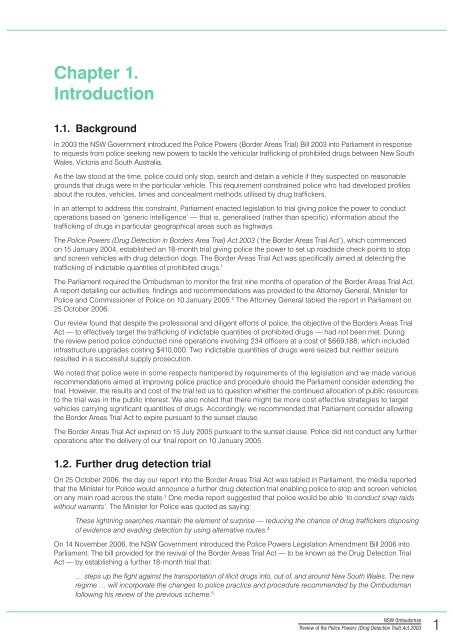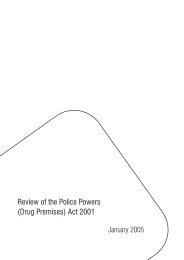Review of the Police Powers (Drug Detection Trial) Act 2003 - NSW ...
Review of the Police Powers (Drug Detection Trial) Act 2003 - NSW ...
Review of the Police Powers (Drug Detection Trial) Act 2003 - NSW ...
Create successful ePaper yourself
Turn your PDF publications into a flip-book with our unique Google optimized e-Paper software.
Chapter 1.<br />
Introduction<br />
1.1. Background<br />
In <strong>2003</strong> <strong>the</strong> <strong>NSW</strong> Government introduced <strong>the</strong> <strong>Police</strong> <strong>Powers</strong> (Border Areas <strong>Trial</strong>) Bill <strong>2003</strong> into Parliament in response<br />
to requests from police seeking new powers to tackle <strong>the</strong> vehicular trafficking <strong>of</strong> prohibited drugs between New South<br />
Wales, Victoria and South Australia.<br />
As <strong>the</strong> law stood at <strong>the</strong> time, police could only stop, search and detain a vehicle if <strong>the</strong>y suspected on reasonable<br />
grounds that drugs were in <strong>the</strong> particular vehicle. This requirement constrained police who had developed pr<strong>of</strong>iles<br />
about <strong>the</strong> routes, vehicles, times and concealment methods utilised by drug traffickers.<br />
In an attempt to address this constraint, Parliament enacted legislation to trial giving police <strong>the</strong> power to conduct<br />
operations based on ‘generic intelligence’ — that is, generalised (ra<strong>the</strong>r than specific) information about <strong>the</strong><br />
trafficking <strong>of</strong> drugs in particular geographical areas such as highways.<br />
The <strong>Police</strong> <strong>Powers</strong> (<strong>Drug</strong> <strong>Detection</strong> in Borders Area <strong>Trial</strong>) <strong>Act</strong> <strong>2003</strong> (‘<strong>the</strong> Border Areas <strong>Trial</strong> <strong>Act</strong>’), which commenced<br />
on 15 January 2004, established an 18-month trial giving police <strong>the</strong> power to set up roadside check points to stop<br />
and screen vehicles with drug detection dogs. The Border Areas <strong>Trial</strong> <strong>Act</strong> was specifically aimed at detecting <strong>the</strong><br />
trafficking <strong>of</strong> indictable quantities <strong>of</strong> prohibited drugs. 1<br />
The Parliament required <strong>the</strong> Ombudsman to monitor <strong>the</strong> first nine months <strong>of</strong> operation <strong>of</strong> <strong>the</strong> Border Areas <strong>Trial</strong> <strong>Act</strong>.<br />
A report detailing our activities, findings and recommendations was provided to <strong>the</strong> Attorney General, Minister for<br />
<strong>Police</strong> and Commissioner <strong>of</strong> <strong>Police</strong> on 10 January 2005. 2 The Attorney General tabled <strong>the</strong> report in Parliament on<br />
25 October 2006.<br />
Our review found that despite <strong>the</strong> pr<strong>of</strong>essional and diligent efforts <strong>of</strong> police, <strong>the</strong> objective <strong>of</strong> <strong>the</strong> Borders Areas <strong>Trial</strong><br />
<strong>Act</strong> — to effectively target <strong>the</strong> trafficking <strong>of</strong> indictable quantities <strong>of</strong> prohibited drugs — had not been met. During<br />
<strong>the</strong> review period police conducted nine operations involving 234 <strong>of</strong>ficers at a cost <strong>of</strong> $669,188, which included<br />
infrastructure upgrades costing $410,000. Two indictable quantities <strong>of</strong> drugs were seized but nei<strong>the</strong>r seizure<br />
resulted in a successful supply prosecution.<br />
We noted that police were in some respects hampered by requirements <strong>of</strong> <strong>the</strong> legislation and we made various<br />
recommendations aimed at improving police practice and procedure should <strong>the</strong> Parliament consider extending <strong>the</strong><br />
trial. However, <strong>the</strong> results and cost <strong>of</strong> <strong>the</strong> trial led us to question whe<strong>the</strong>r <strong>the</strong> continued allocation <strong>of</strong> public resources<br />
to <strong>the</strong> trial was in <strong>the</strong> public interest. We also noted that <strong>the</strong>re might be more cost effective strategies to target<br />
vehicles carrying significant quantities <strong>of</strong> drugs. Accordingly, we recommended that Parliament consider allowing<br />
<strong>the</strong> Border Areas <strong>Trial</strong> <strong>Act</strong> to expire pursuant to <strong>the</strong> sunset clause.<br />
The Border Areas <strong>Trial</strong> <strong>Act</strong> expired on 15 July 2005 pursuant to <strong>the</strong> sunset clause. <strong>Police</strong> did not conduct any fur<strong>the</strong>r<br />
operations after <strong>the</strong> delivery <strong>of</strong> our final report on 10 January 2005.<br />
1.2. Fur<strong>the</strong>r drug detection trial<br />
On 25 October 2006, <strong>the</strong> day our report into <strong>the</strong> Border Areas <strong>Trial</strong> <strong>Act</strong> was tabled in Parliament, <strong>the</strong> media reported<br />
that <strong>the</strong> Minister for <strong>Police</strong> would announce a fur<strong>the</strong>r drug detection trial enabling police to stop and screen vehicles<br />
on any main road across <strong>the</strong> state. 3 One media report suggested that police would be able ‘to conduct snap raids<br />
without warrants’. The Minister for <strong>Police</strong> was quoted as saying:<br />
These lightning searches maintain <strong>the</strong> element <strong>of</strong> surprise — reducing <strong>the</strong> chance <strong>of</strong> drug traffickers disposing<br />
<strong>of</strong> evidence and evading detection by using alternative routes. 4<br />
On 14 November 2006, <strong>the</strong> <strong>NSW</strong> Government introduced <strong>the</strong> <strong>Police</strong> <strong>Powers</strong> Legislation Amendment Bill 2006 into<br />
Parliament. The bill provided for <strong>the</strong> revival <strong>of</strong> <strong>the</strong> Border Areas <strong>Trial</strong> <strong>Act</strong> — to be known as <strong>the</strong> <strong>Drug</strong> <strong>Detection</strong> <strong>Trial</strong><br />
<strong>Act</strong> — by establishing a fur<strong>the</strong>r 18-month trial that:<br />
… steps up <strong>the</strong> fight against <strong>the</strong> transportation <strong>of</strong> illicit drugs into, out <strong>of</strong>, and around New South Wales. The new<br />
regime … will incorporate <strong>the</strong> changes to police practice and procedure recommended by <strong>the</strong> Ombudsman<br />
following his review <strong>of</strong> <strong>the</strong> previous scheme. 5<br />
<strong>NSW</strong> Ombudsman<br />
<strong>Review</strong> <strong>of</strong> <strong>the</strong> <strong>Police</strong> <strong>Powers</strong> (<strong>Drug</strong> <strong>Detection</strong> <strong>Trial</strong>) <strong>Act</strong> <strong>2003</strong><br />
1

















